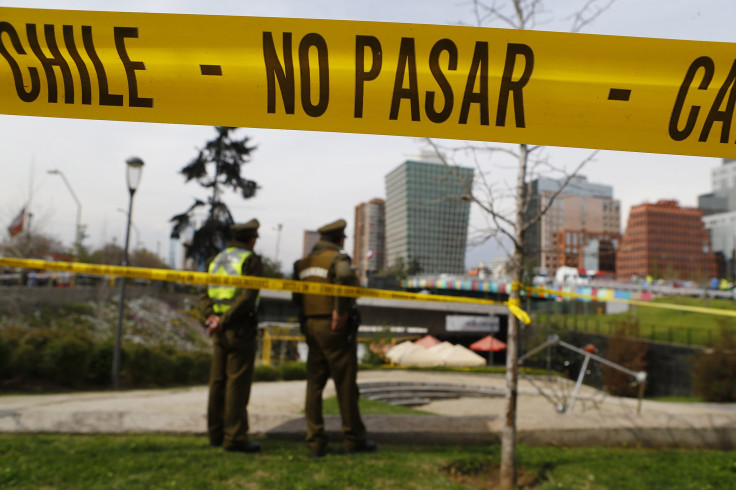Blast In Chile Is 29th Bomb This Year, But Perpetrators Remain Mysterious

The bomb that exploded outside a Santiago metro station on Monday was the worst attack Chile has seen in nearly three decades, with a toll of 14 injured. Chile still boasts one of the lowest rates of violence in Latin America, but dozens of bombs have been defused around the country this year alone -- an epidemic of violent acts that may not have resulted in any fatalities yet, but that analysts say may take over President Michelle Bachelet’s reform-centric agenda.
Chile’s government called Monday’s blast an act of terrorism, although no one has yet claimed responsibility for the attack. It’s the 29th bomb that police forces have uncovered around the country in the past year, and the perpetrators remain mysterious. Most of the previous attempts involved rudimentary bombs filled with gunpowder and were never detonated; the few that did explode did not result in any injuries.
Many of this year’s other bomb threats were attributed to scattered anarchist groups around the country, some of whom were protesting against the detention of two Chilean anarchists detained in Spain for a 2013 bombing there. Generally, the bombs have targeted banks, police stations, churches and supermarkets, and those that were detonated went off in the middle of the night. One bomb in July was planted in the Los Dominicos subway station, though police evacuated the area before it went off. Monday’s attack was one of the first instances of a bomb going off in broad daylight in a crowded metro location.
President Bachelet assured the public on Monday that Chile was still a safe place. “What happened today is horrible, tremendously condemnable, but Chile is and will remain a safe country,” she said.
The statistics agree: Chile has some of the region’s lowest rates of violent crime and homicide, with three murders per 100,000 people compared to Latin America’s average of 23. But the escalation in bomb threats this year and the toll of Monday’s attack have put public pressure on the government to ramp up its national security efforts.
“This is not a country that is racked by insecurity, but these bombs that have gone off in fairly rapid succession have created a sense of concern about what’s going on and opened up a debate about what the government is doing in the security arena,” said Cynthia Arnson, director of the Wilson Center’s Latin America program. “The main pressure is on the government to investigate and prosecute the people responsible for these incidents. If it fails to do that, and the explosions continue, the government is going to be faced with a very distinct problem.”
Arnson also said the national security question could take over the domestic reform agenda of President Bachelet, who stepped into her second presidential term this year.
“The Bachelet administration defined itself on issues other than security -- tax reform, education reform, and the possibility of a constitutional reform. This completely shifts the debate away from the issues that she wanted to focus on and devote her energies to,” Arnson said.
And in fact, Bachelet had already been stepping up national security efforts even before Monday’s explosion: Last month, she appointed a special prosecutor to exclusively investigate the escalating bomb threats.
Monday’s blast also refocuses attention on the country’s controversial anti-terrorism law, first passed in 1984 at the tail end of the Pinochet dictatorship. The administration announced that it would invoke the law in tracking down the culprits for the latest attack. The law gives harsher sentences for those convicted, and allows police to detain suspects without any charges. It also allows for the use of “secret witnesses” in investigations. But critics say that despite the broadened powers of the anti-terrorism law, the government has largely failed to find and prosecute those responsible.
© Copyright IBTimes 2024. All rights reserved.






















